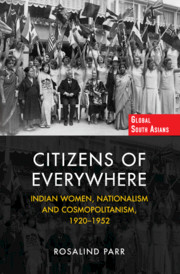Book contents
- Frontmatter
- Dedication
- Contents
- List of Figures
- Acknowledgements
- Note on Spelling
- List of Abbreviations
- Introduction: Cosmopolitanism, Nationalism and the Global Public Sphere
- 1 The Cosmopolitan-Nationalism of Sarojini Naidu
- 2 Suffrage; Solidarity
- 3 Becoming Global Citizens
- 4 Breaking America
- 5 A Changing World Order?
- 6 Defining Human Rights
- Conclusion
- Appendix 1 Dramatis Personae
- Appendix 2 The Universal Declaration of Human Rights
- Bibliography
- Index
6 - Defining Human Rights
Published online by Cambridge University Press: 06 August 2021
- Frontmatter
- Dedication
- Contents
- List of Figures
- Acknowledgements
- Note on Spelling
- List of Abbreviations
- Introduction: Cosmopolitanism, Nationalism and the Global Public Sphere
- 1 The Cosmopolitan-Nationalism of Sarojini Naidu
- 2 Suffrage; Solidarity
- 3 Becoming Global Citizens
- 4 Breaking America
- 5 A Changing World Order?
- 6 Defining Human Rights
- Conclusion
- Appendix 1 Dramatis Personae
- Appendix 2 The Universal Declaration of Human Rights
- Bibliography
- Index
Summary
[I]f we are aiming at an international authority which would preserve the peace of the world. It is absolutely necessary for the states to delegate a fraction of their sovereignty to [the United Nations].
During the final three decades of colonial rule, anti-colonial women's interactions were framed by the need to assert nationalist legitimacy and undermine imperial domination. As independence became inevitable, there was notable continuity between this approach and the Indian state's engagement with the United Nations (UN). Central to Nehruvian foreign policy was the assumption of moral leadership in the global struggle against imperial-style domination. One manifestation of this was Hansa Mehta's work on the UN Commission on Human Rights (CHR) that, although she operated as a state representative, also reflects her civil society connections. The measurable results of the CHR's lengthy, acrimonious proceedings were limited, amounting only to the very general, non-binding set of principles outlined in the Universal Declaration of Human Rights (UDHR). Nevertheless, Mehta's work on the CHR indicate that the UN's adoption of human rights was associated as much with civil society petitioners as it was with Western governments, who appropriated human rights for geopolitical gain.
(Soon-to-be) independent India and the United Nations
During the 1930s, Nehru had been wary of the League of Nations, which he viewed as an agent of the imperialist status quo. As Prime Minister of (soon-to-be) independent India, Nehru was not blind to the imperialist ambitions of the world's most powerful states, as his non-aligned foreign policy suggests. But he nevertheless saw the UN as an opportunity to advance Indian interests. Soon after assuming leadership of the Interim Government in September 1946, he appointed Vijaya Lakshmi Pandit as leader of the Indian delegation to the UN General Assembly. Her opening address announced India's ambitions to the world:
India does not yet play a sufficiently effective part in this Assembly. She desires and intends to do so. As a major country, geographically in a strategic position in the Indian Ocean, with significant relations and cultural ties with her neighbours in Asia, the contribution she has made in resistance to aggression and the cause of human freedom and her role in world economy entitle her to a place in the important organs of the United Nations – I would mention especially the Security and Trusteeship Councils – and an adequate share in the administration of the Organization.
- Type
- Chapter
- Information
- Citizens of EverywhereIndian Women, Nationalism and Cosmopolitanism, 1920–1952, pp. 135 - 152Publisher: Cambridge University PressPrint publication year: 2021



